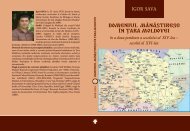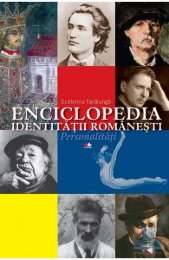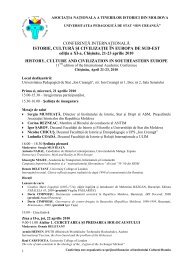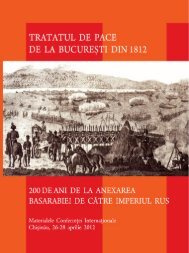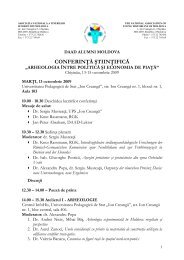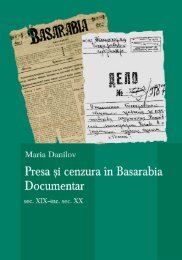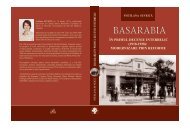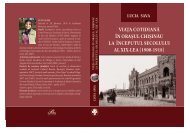Summary The importance of the political programme supported by the Bishop Inochentie Mi<strong>cu</strong>-Klein and the reasons of his exile The Bishop Inochentie Mi<strong>cu</strong>-Klein is the initiatiator of the programmatic political struggle of the Romanians from Transylvania. Remarkable personality of our national history, the erudite theologian of the Greek-Catholic Church United with Rome, was in the XVII-th century an important militant for the political and social emancipation of the Transylvanian Rumanians, from under the anachronic Austro-Hungarian supremacy. He was established as Greek-Catholic Bishop of Alba-Iulia and Făgăraş, on 5 th of November 1730 and Carol the VI-th granted him in 1732 a place in the Transylvanian Diet. In his time, since 1688, Transylvania has been dominated by Austria. The segregationist legislation of the Principality was still in force: Werboczi’s Tripartite (1514), Approbatae Constitutiones (1653) and Compillatae Constitutiones (1699), although in 1762 the Romanians represented 66% from the Principality’s population, Hungarians and secklers 21%, Saxons 11%, other nationalities around 2,2%. Due to these discriminating laws, Romanians became “tolerated” on their own ancient land. Because of these conditions and because Romanians were catholic, the only solution for the Transylvanian Romanians was to get closer to Rome or to the Court of Wien. Accor<strong>din</strong>g to the Bishop Inochentie’s opinion, the United Romanian Church was the only institution of that period, which could help the Romanians to avoid the Calvinism and denationalization. Being treated with arrogance by the members of the Transylvanian Diet, Inochentie will strongly protect his points of view concerning the roman origin of Romanian people as well as the Latin origin of Romanian language and the continuity of roman colonists on Dacia’s territory. Tenaciously, he puts forward to the Emperor Carol the 6-th, 24 memoirs, asking for: a) The content of the two Leopoldian diplomas (the one from 1699 and the one from 1701) to be respected by the Diet. b) The Romanian people to be treated the same as the other people from the empire, because they are the oldest and the most numerous in Transylvania. c) The bishop and the united priests to benefit by the same rights as the roman-catholic priests. d) The income of the Romanian bishop to be increased, so that he can help other priests and poorer churches. e) Romanian aristocrats to be named accor<strong>din</strong>g to their qualification and their abilities in the official jobs in the state. f) In the counties with Romanian majority, the prefects should be Romanian. g) Elementary schools should be built for the Romanian people in all villages. h) The young Romanians should be permitted to attend school. i) Upper education should be founded for the Romanians in Alba-Iulia, Fagaraş, Haţeg j) For the young Romanian gifted people, the schools from abroad should be opened. Through his generous ideas, the united bishop settled that spiritual renaissance trend, called Şcoala Ardeleană. He is not only a forerunner of Şcoala Ardeleană, but also an ideologue of the ideas of French Revolution in 1789: liberty, equality, fraternity. For his daring applies, he was investigated by the Imperial Court and labeled by Maria Teresa as a rebelious. The exile in Rome was imposed to him, and he left there in 1751. He suffered the torture of the exile for 24 years, and in 1751 he abdicated the bishopric. Yet, he kept on sen<strong>din</strong>g memoirs to the authorities and numerous letters from the exile. He died in Rome, on the 22nd of September 1768. The relics of the famous bishop were brought in the country in 1997, and laid in the Metropolitan Cathedral in Blaj,the cathedral being founded by him. – 1 –
Bibliografie BODEA, D., 2000. Cuvânt despre inochentie Mi<strong>cu</strong>, înaintemergătorul, în Cultura creştină, Blaj, serie nouă, anul IV, nr. 1, 15-18. CHINDRIŞ, I., 1998. inochentie Mi<strong>cu</strong>-Klein, omul de <strong>cu</strong>ltură, în Cetatea <strong>cu</strong>lturală, Cluj, An I, septembrie, nr. 4. CUCERZAN, E. S., 2000. Fidelitatea episcopului ioan inocenţiu Mi<strong>cu</strong>-Klein faţă de Biserica Greco - Catolică şi Biserica Romei, în Cultura creştină, Blaj, serie nouă, anul IV, nr. 1, 80. CUVÂNTUL i.P.S. Lucian Mureşan, Arhiepiscop şi Mitropolit al Bisericii Române unite <strong>cu</strong> Roma, Greco- Catolică, 2000, în Cultura creştină, Blaj, serie nouă, an. IX, nr. 1, 7-11. DĂNILĂ, N., 2000. Mormântul episcopului ioan inocenţiu Mi<strong>cu</strong>-Klein la Roma (1768-1997), în Cultura creştină, Blaj, serie nouă, anul IV, nr. 1, 149-160. DRĂGAN, J.C., 2000. inochentie Mi<strong>cu</strong> - lupta pentru afirmarea naţiunii române, în Cultura creştină, Blaj, serie nouă, anul IV, nr. 1, 22-25. EDROIU, N., 2000. Lupta episcopului ioan inocenţiu Mi<strong>cu</strong>-Klein în viziunea Mitropolitului Alexandru şterca şuluţiu, în Cultura creştină, Blaj, serie nouă, anul IV, nr. 1, 82-86. GIURESCU, C. C., 1972. istoria României în date, Editura Enciclopedică română, Bu<strong>cu</strong>reşti. LASCU,V., 2000. Melius est innocenter Pati … , în Cultura creştină, Blaj, serie nouă, anul IV, nr. 1, 42-46. MICU-KLEIN, I.I., 2000. Arhieraticon – ediţie după originalul manuscris (studiu introductiv de Ioan Chindriş; transcrierea textului: Florica Nuţiu şi Ioan Chindriş), România Press, Bu<strong>cu</strong>reşti. MICU-KLEIN, I.I., 1992, Carte de înţelepciune latină. illustrium poetarum flores. Florile poeţilor iluştri, ediţie de Florea Firan şi Bogdan Hân<strong>cu</strong>, Bu<strong>cu</strong>reşti. MIRCEA, D., 2000. inocenţiu Mi<strong>cu</strong> Clein – uni<strong>cu</strong>l, în Cultura creştină, Blaj, serie nouă, anul IV, nr. 1, 39. MOLDOVAN, I., 2000. Schiţă de portret psihologic al lui inocenţiu, în Cultura creştină, Blaj, serie nouă, anul IV, nr. 1, 48. NISTOR, S. I., 2000. Programul lui inocenţiu Mi<strong>cu</strong> pentru ridicarea românilor la rangul de naţiune politică, în Cultura creştină, Blaj, serie nouă, anul IV, nr. 1, 58-71. PĂVALĂ, T. P., 2000. inocenţiu Mi<strong>cu</strong>-Klein; omagiu întemeietorului, în Cultura creştină, Blaj, serie nouă, anul IV, nr. 1, 19. POP, G., 2000. ioan inocenţiu Mi<strong>cu</strong>-Klein pre<strong>cu</strong>rsor al şcolii Ardelene, în Cultura creştină, Blaj, serie nouă, anul IV, nr. 1, 87- 91. PRODAN, D., 1964. Lupta lui Inochentie Mi<strong>cu</strong> pentru ridicarea politică a românilor, în Istoria României, vol. III, Editura Academiei RPR, Bu<strong>cu</strong>reşti. SUCIU, A., 2000. Vlădi<strong>cu</strong>l ioan inocenţiu Mi<strong>cu</strong>-Klein şi unirea <strong>cu</strong> Roma, în Cultura creştină, Blaj, serie nouă, an. IV, nr. 1, 53-57. ŞTIRBAN, M., 2000. inochentie Mi<strong>cu</strong> Klein – un drum deschis, un mesaj împlinit, în Cultura creştină, Blaj, serie nouă, anul IV, nr. 1, 93. – 1 – © Florica-elisabeta NUţIU, 2008
- Page 1 and 2:
analele asocıaŢıeı naŢıonale
- Page 3 and 4:
cuprıns epoca antică Corneliu Bel
- Page 5 and 6:
Epoca antică - -
- Page 7 and 8:
diman, 2003c, 2003d, 2004b, 2004d).
- Page 9 and 10:
effectifs et typologie Plus de la m
- Page 11 and 12:
technologiques et culturelle durant
- Page 13 and 14:
CÂRCIUMARU M., MĂRGĂRIT M. et al
- Page 15 and 16:
Fig. 2. Art mobilier au Paléolithi
- Page 17 and 18:
ıdentıtate socıală Şı podoaBe
- Page 19 and 20:
IIIb-IIIc, etapa de locuire A. Pies
- Page 21 and 22:
Cronica cercetărilor arheologice d
- Page 23 and 24:
Fig. . Valve de Unio sp. aparţinâ
- Page 25 and 26:
Dunării a trecut prin teritoriul d
- Page 27 and 28:
ea a fost catalogată ca un mare ca
- Page 29 and 30:
cunoaşte dacă exista şi un recip
- Page 31 and 32:
înşiruire ne poate oferi o idee
- Page 33 and 34:
BıBlıoGraFıe cataloaGe Price 199
- Page 35 and 36:
Poenaru Bordea 2001 - Gh. Poenaru B
- Page 37 and 38:
consıderaŢıı prıvınd Încadra
- Page 39 and 40:
proporţia acestora. În total au f
- Page 41 and 42:
ZusammenFassunG ÜBerleGunGen Zur K
- Page 43 and 44:
Fig. 4. Vârfuri de lance din epoca
- Page 45 and 46:
Plecând de la aceste observaţii,
- Page 47 and 48:
venind din flota de la Misena, ce s
- Page 49 and 50:
După reprimarea marilor răscoale
- Page 51 and 52:
Claudia, la Durostorum (Silistra),
- Page 53 and 54:
Archaeology dell’Universitá di S
- Page 55 and 56:
draGomır, ı. t. 1 . Descoperiri a
- Page 57 and 58:
a. b. Fig. 1. Bărboşi. Promontori
- Page 59 and 60:
arHeoloGıe Şı polıtıcă: caZul
- Page 61 and 62:
şi au construit un stil maiestuos,
- Page 63 and 64:
cultura drıdu Şı evoluŢıa poZ
- Page 65 and 66:
istorice ale unor realităţi arheo
- Page 67 and 68:
lui Adrian Păunescu la începutul
- Page 69 and 70:
omâni în timpul regimului comunis
- Page 71 and 72:
Ages: Issues and Readings, Oxford,
- Page 73 and 74: neapărat să explice vizitatorilor
- Page 75 and 76: determınărı & dımensıunı ale
- Page 77 and 78: utilizează fonduri de stat - au î
- Page 79 and 80: teorıa celor două popoare - stud
- Page 81 and 82: „din secolul al Vi-lea până la
- Page 83 and 84: leme neclarificate. La acestea adă
- Page 85 and 86: elaŢııle domnılor moldoveı cu
- Page 87 and 88: în perioada pribegiilor sale la ac
- Page 89 and 90: ınFluenŢa unıverstăŢıı dın
- Page 91 and 92: Košice, cum ar fi, spre exemplu, u
- Page 93 and 94: extindere, cîţiva studenţi de la
- Page 95 and 96: Majoritatea studenţilor de la Koš
- Page 97 and 98: estul Germaniei. În 1599 Bocacius
- Page 99 and 100: tät, Land und Konfession 1500 bis
- Page 101 and 102: Fig. 1: Universităţile germane ex
- Page 103 and 104: de la Oliva, ci a încheiat separat
- Page 105 and 106: Grecıı În comerŢul cu ımperıu
- Page 107 and 108: proveneau din dările pe vite 1 şi
- Page 109 and 110: iStORia ROmÂnilOR 2003, vol. V, Ed
- Page 111 and 112: îi permitea să-şi formeze o opin
- Page 113 and 114: Cât priveşte St. Leszczynski, dat
- Page 115 and 116: vizată doi sultani au fost înlăt
- Page 117 and 118: suedezul în schiţa lui Nicolae Mu
- Page 119 and 120: alta. Acest proces şi războaiele
- Page 121 and 122: În aceste condiţii, singura solu
- Page 123: Militantul pentru idealurile naţio
- Page 127 and 128: evoluŢıa ımaGoloGıcă a revolu
- Page 129 and 130: fost creat prin discursul politic,
- Page 131 and 132: Poporul a fost perceput ca un compl
- Page 133 and 134: orchestrate de soldaţii secui. Act
- Page 135 and 136: capabil de a sensibiliza o populaţ
- Page 137 and 138: olul noBılımıı În vıaŢa puBl
- Page 139 and 140: ton de Verrayon se propune; a scoat
- Page 141 and 142: ezumé L’article ,,Le rôle de la
- Page 143 and 144: olul Şı locul mınorıtăŢılor
- Page 145 and 146: aspecte ale proGramuluı Şı actı
- Page 147 and 148: Manifestul din 17 octombrie 1905 a
- Page 149 and 150: - fracţiunea „Trudovicilor”, c
- Page 151 and 152: Cоnform informaţiilor secrete, or
- Page 153 and 154: elaborate de către Comitetul unit
- Page 155 and 156: locale, solicitând începerea miş
- Page 157 and 158: „proBlema aromÂnă” Şı cauZe
- Page 159 and 160: Amplificarea tensiunii diplomatice
- Page 161 and 162: statul român nu avea cu cine să d
- Page 163 and 164: Atena s-au complicat pe fundalul co
- Page 165 and 166: generale sanitare; fiecare inspecto
- Page 167 and 168: „Monitorul oficial”, Nr. 154 di
- Page 169 and 170: jud. Soroca. În 1883 este admis la
- Page 171 and 172: necessıtY oF HumanıZatıon oF tea
- Page 173 and 174: Subject to «pro et contra», there
- Page 175 and 176:
In Ukraine it is limited by the sys
- Page 177 and 178:
- organizes certification of pedago
- Page 179 and 180:
ınstıtuŢııle cultural-educatı
- Page 181 and 182:
Soroca 1 - unica instituţie de pro
- Page 183 and 184:
în Basarabia. Deja în cadrul lucr
- Page 185 and 186:
„naţionalismul burghez”, absol
- Page 187 and 188:
ÎnvăŢămÎntul ıstorıc superı
- Page 189 and 190:
Menirea acestor instituţii era de
- Page 191 and 192:
funcţia de decan al Facultăţii d
- Page 193 and 194:
Bibliografie BURLACU, Valentin, 200
- Page 195 and 196:
(ianuarie 1918), înăbuşind cu fo
- Page 197 and 198:
Rusia, rămân sub dominaţia Porţ
- Page 199 and 200:
această situaţie se datorează no
- Page 201 and 202:
trecut complet sub tăcere pentru
- Page 203 and 204:
etrospectıva deZvoltărıı orGan
- Page 205 and 206:
cei care călătoreau pentru a găs
- Page 207 and 208:
latGale as lIeUX De MeMOIRe: re-tH
- Page 209 and 210:
It was mistake of Russian administr
- Page 211 and 212:
unique historical way of Latgale -
- Page 213 and 214:
intellectuals in Latgale were very
- Page 215 and 216:
BREŽGO, B., 1940, Latgalos zemniek
- Page 217 and 218:
ţinut până la mijlocul secolului
- Page 219 and 220:
fierari dintre vătraşi. Documente
- Page 221 and 222:
gubernatorului Basarabiei, Scarlat
- Page 223 and 224:
pămÂnturı natale, ıdeal naŢıo
- Page 225 and 226:
vreme ce, la Reghin, nu exista o co
- Page 227 and 228:
să intre trupele Antantei şi să
- Page 229 and 230:
MAJDÚ, Tibor, NAGY, Zsuza L. 1990.
- Page 231 and 232:
c) comentarii ale presei dobrogene
- Page 233 and 234:
Un loc aparte au ocupat ştirile ca
- Page 235 and 236:
Politica de rezistenţă declanşat
- Page 237 and 238:
Bibliografie BERSTEIN, Serge, MILZA
- Page 239 and 240:
în continuare arenda drept o form
- Page 241 and 242:
Tabelul 2 Distribuirea cotelor-păr
- Page 243 and 244:
internaţionale, unei societăţi d
- Page 245 and 246:
aporturıle repuBlıcıı moldova c
- Page 247 and 248:
nimeni nu are dreptul, nu va fi în
- Page 249 and 250:
preşedintele Snegur drept „un su
- Page 251 and 252:
o prăbuşire a pieţei ruse în 19
- Page 253 and 254:
aBStRaCt On September 22, 1990, in
- Page 255 and 256:
O alta prioritate în activitatea a
- Page 257 and 258:
„cu alte republici ce şi-au proc
- Page 259 and 260:
ımplıcaŢıı Geopolıtıce ale u
- Page 261 and 262:
în localităţile locuite preponde
- Page 263 and 264:
natală. De fapt, aceasta s-a făcu
- Page 265 and 266:
polıtıca statuluı FaŢă de ınt
- Page 267 and 268:
Politica statului sovietic faţă d
- Page 269 and 270:
5. АRTOBOLEVSKII I., VLADISLAVLEV
- Page 271 and 272:
Recenzii - 1 -
- Page 273 and 274:
În rezultatul analizei pieselor de
- Page 275 and 276:
ografia de la sfârşitul lucrării
- Page 277 and 278:
comprehension that besides the prom



